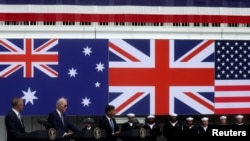The United States is a proud Indo-Pacific nation and, along with its allies and partners, shares a vision of an Indo-Pacific that is free, open, connected, and prosperous.
Since the Biden-Harris Administration launched its Indo-Pacific Strategy two years ago, significant progress has been made in advancing that vision. As National Security Communications Advisor John Kirby outlined at a recent press briefing, that advancement has occurred by revitalizing and reinvesting in regional partnerships:
“We’ve initiated AUKUS [the Australia, United Kingdom, United States trilateral security partnership] and that process is moving along on schedule to get Australia nuclear-powered submarine capability. We’ve elevated the Quad — the Indo-Pacific Quad. We’ve upgraded our relationships with Vietnam, with Indonesia, and with ASEAN,” he said.
“And of course … the President hosted the leaders of Japan and South Korea at Camp David and really got not only significant developments in terms of our bilateral relationship with each country, each ally, but improved opportunities to — to get trilateral cooperation in a much better place than it’s ever been.”
The enhanced U.S. engagement with partners has yielded fruits in a variety of arenas, including the diplomatic, economic and defense realms.
For example, as the State Department noted in a statement, in the diplomatic arena, the United States has worked to advance human rights and democratic institutions around the world: pushing for accountability on human rights abuses in the PRC, the DPRK and Burma; supporting our Philippine allies in their efforts to grow the voices upholding the international law of the sea.
In the economic realm, the United States is prioritizing investments to encourage innovation, strengthen economic competitiveness, fortify supply chains, and expand economic opportunities for all in the Indo-Pacific. Foreign direct investment from the United States in the region has nearly doubled in the last decade. And companies based in the APEC region have announced almost $200 billion of investment in the U.S. since the start of the Biden Administration.
In the area of defense, the United States continues to deepen cooperation, support allies’ and partners’ investments in their own capabilities, and enhance interoperability to promote regional security.
“The United States,” the State Department declared, “continues to demonstrate leadership and commitment to the Indo-Pacific, reinforcing the region’s capacity and resilience to address the challenges and opportunities of the 21st century and showing we can build a better future together.”






